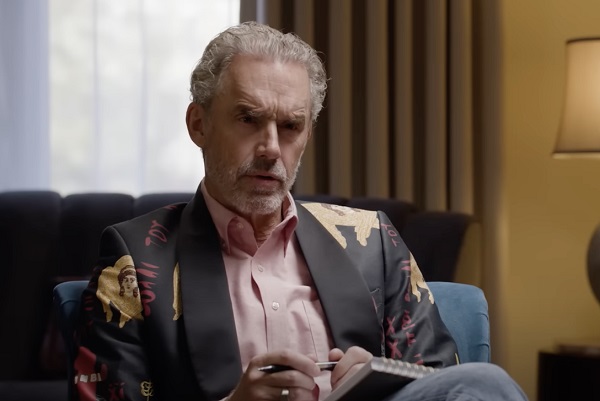Censorship Industrial Complex
Jordan Peterson says he rejected regulator’s offer to pay legal fees in exchange for resignation

From LifeSiteNews
The free speech advocate said the College of Psychologists of Ontario mistakenly thought he could ‘be bought’ after losing his court appeal challenging that he submit to social media training to keep his license.
Best-selling Canadian author and clinical psychologist Dr. Jordan Peterson says his regulatory college offered him a deal to “be bought” in which the legal fees owed to them after losing his court challenge could be waived but only if he agreed to quit his job as a psychologist.
Peterson, who gained fame for his vigorous defense of free speech, announced the offer, as he put it, “to be bought” from the College of Psychologists of Ontario (CPO) in an opinion piece posted by the National Post on October 11. He said that lawyers from the CPO told him that “a settlement offer might be possible” if he resigned, but doing so would bar him from being able to practice in the province.
He noted the CPO’s “first offer was (get this — and I still can’t believe it): ‘If Dr. Peterson agrees to resign, we would be willing to forgo the legal costs the court ruled he owes us!’”
Peterson observed that the CPO’s “opening gambit was based on the assumptions (1) that I could be bought and (2) that I could be bought cheaply.”
“The first was truly insulting, as well as preposterous: If cost alone was going to stop me, it would have happened long ago,” he wrote.
“The second was ironically laughable, and an indication of their ignorance regarding what is at stake here: If I was for sale — and I am not — it would be for a hell of a lot more than the court costs that the Supreme Court deemed me liable for when my appeal was rejected.”
Peterson said that he is already in “over my head for a lot more than that on the expenditure side alone.”
“In addition, I have enough stable sources of income now arrayed around me such that the amount in question is not a relevant determinant of my behaviour, as the college tyrannocrats should have realized, had they done an iota of necessary homework.”
Peterson observed that one of the reasons the CPO has begun to negotiate with him over the fees owed is because it is now “backed in a corner.”
In August 2023, Peterson lost an appeal against the CPO when they mandated that he undergo social media “training” to keep his license after he made posts on X, formerly Twitter, criticizing Prime Minister Justin Trudeau and LGBT activists, and specifically, the mutilation of children. He was then ordered to pay $25,000 to the CPO.
Last month, as reported by LifeSiteNews, Peterson agreed to accept the CPO’s social media “training,” saying he was doing so to defend free speech for all Canadians.
This came after a ruling in August by the Supreme Court of Canada, which refused to hear Peterson’s appeal to the CPO regarding the threat of losing his license unless he submit to the social media “training.”
‘God only knows how it will all end’
Peterson is a professor emeritus of psychology at the University of Toronto and has gotten into trouble from regulatory bodies for repeatedly calling out the “trans-butchery of minor children” as a “crime against humanity.”
He has also been a vocal critic of Canadian health and government officials for promoting COVID mandates and jabs as “safe.”
Regarding the CPO’s offer, Peterson said that after he was ordered by the court to undergo social media “training,” he had asked for the names of those who would be ready to re-educate” him. However, the names of the so-called “social media experts” tasked with the re-“education” were redacted when he received them.
“One problem remained, and a serious one, indeed, practically speaking: the very lines in the document that contained the identifying information of the experts (names, email addresses, professional standing, and telephone numbers) had been redacted,” he wrote.
“Note also that since it is now early October, the college only has about seven weeks to straighten out the mess they created around themselves, without violating their own rules, and to repair me one way or another, in the hopefully permanent manner they are devoutly hoping to manage.”
The CPO’s mandate that Peterson undergo social media “training” must be done by November.
In concluding the opinion piece, Peterson noted, “God only knows how it will all end.”
“But it certainly appears, as of the current moment, that the much-vaunted and much-moralized-publicly-about re-education efforts of the Ontario College of Psychologists and Behaviour Analysts have been brought to a shuddering and shameful halt, not least because of the utter indefensibility of their own position,” he wrote.
Peterson has warned Canadian professionals to “wake up” to the rise of cancel culture.
“Wake up, citizens: professionals are now required to hold their tongue if they believe anything politically verboten. For all you leaning to the left – sometimes validly: these precedents will eventually be weaponized by those who stand opposed to you,” he posted.
Business
Telegram founder Pavel Durov exposes crackdown on digital privacy in Tucker Carlson interview

From LifeSiteNews
By Robert Jones
Durov, who was detained in France in 2024, believes governments are seeking to dismantle personal freedoms.
Tucker Carlson has interviewed Telegram founder Pavel Durov, who remains under judicial restrictions in France nearly a year after a surprise arrest left him in solitary confinement for four days — without contact with his family, legal clarity, or access to his phone.
Durov, a Russian-born tech executive now based in Dubai, had arrived in Paris for a short tourist visit. Upon landing, he was arrested and accused of complicity in crimes committed by Telegram users — despite no evidence of personal wrongdoing and no prior contact from French authorities on the matter.
In the interview, Durov said Telegram has always complied with valid legal requests for IP addresses and other data, but that France never submitted any such requests — unlike other EU states.
Telegram has surpassed a billion users and over $500 million in profit without selling user data, and has notably refused to create government “backdoors” to its encryption. That refusal, Durov believes, may have triggered the incident.
READ: Arrest of Telegram founder Pavel Durov signals an increasing threat to digital freedom
French prosecutors issued public statements, an unusual move, at the time of his arrest, fueling speculation that the move was meant to send a message.
At present, Durov remains under “judicial supervision,” which limits his movement and business operations.
Carlson noted the irony of Durov’s situating by calling to mind that he was not arrested by Russian President Vladimir Putin but rather a Western democracy.
Former President of Russia Dmitry Medvedev has said that Durov should have stayed in Russia, and that he was mistaken in thinking that he would not have to cooperate with foreign security services.
Durov told Carlson that mandates for encryption “backdoors” endanger all users, not just suspects. Once created, such tools inevitably become accessible to hackers, foreign agents, and hostile regimes.
“In the US,” he commented, “you have a process that allows the government to actually force any engineer in any tech company to implement a backdoor and not tell anyone about it.”
READ: Does anyone believe Emmanuel Macron’s claim that Pavel Durov’s arrest was not political?
Durov also pointed to a recent French bill — which was ultimately defeated in the National Assembly — that would have required platforms to break encryptions on demand. A similar EU proposal is now under discussion, he noted.
Despite the persecution, Durov remains committed to Telegram’s model. “We monetize in ways that are consistent with our values,” he told Carlson. “We monetized without violating privacy.”
There is no clear timeline for a resolution of Durov’s case, which has raised serious questions about digital privacy, online freedom, and the limits of compliance for tech companies in the 21st century.
Censorship Industrial Complex
Alberta senator wants to revive lapsed Trudeau internet censorship bill

From LifeSiteNews
Senator Kristopher Wells and other senators are ‘interested’ in reviving the controversial Online Harms Act legislation that was abandoned after the election call.
A recent Trudeau-appointed Canadian senator said that he and other “interested senators” want the current Liberal government of Prime Minister Mark Carney to revive a controversial Trudeau-era internet censorship bill that lapsed.
Kristopher Wells, appointed by former Prime Minister Justin Trudeau last year as a senator from Alberta, made the comments about reviving an internet censorship bill recently in the Senate.
“In the last Parliament, the government proposed important changes to the Criminal Code of Canada designed to strengthen penalties for hate crime offences,” he said of Bill C-63 that lapsed earlier this year after the federal election was called.
Bill C-63, or the Online Harms Act, was put forth under the guise of protecting children from exploitation online.
While protecting children is indeed a duty of the state, the bill included several measures that targeted vaguely defined “hate speech” infractions involving race, gender, and religion, among other categories. The proposal was thus blasted by many legal experts.
The Online Harms Act would have in essence censored legal internet content that the government thought “likely to foment detestation or vilification of an individual or group.” It would be up to the Canadian Human Rights Commission to investigate complaints.
Wells said that “Bill C-63 did not come to a vote in the other place and in the dying days of the last Parliament the government signaled it would be prioritizing other aspects of the bill.”
“I believe Canada must get tougher on hate and send a clear and unequivocal message that hate and extremism will never be tolerated in this country no matter who it targets,” he said.
Carney, as reported by LifeSiteNews, vowed to continue in Trudeau’s footsteps, promising even more legislation to crack down on lawful internet content.
Before the April 28 election call, the Liberals were pushing Bill C-63.
Wells asked if the current Carney government remains “committed to tabling legislation that will amend the Criminal Code as proposed in the previous Bill C-63 and will it commit to working with interested senators and community stakeholders to make the changes needed to ensure this important legislation is passed?”
Seasoned Senator Marc Gold replied that he is not in “a position to speculate” on whether a new bill would be brought forward.
Before Bill C-63, a similar law, Bill C-36, lapsed in 2021 due to that year’s general election.
As noted by LifeSiteNews, Wells has in the past advocated for closing Christian schools that refuse to violate their religious principles by accepting so-called Gay-Straight Alliance Clubs and spearheaded so-called “conversion therapy bans.”
Other internet censorship bills that have become law have yet to be fully implemented.
Last month, LifeSiteNews reported that former Minister of Environment Steven Guilbeault, known for his radical climate views, will be the person in charge of implementing Bill C-11, a controversial bill passed in 2023 that aims to censor legal internet content in Canada.
-

 International23 hours ago
International23 hours agoIsrael’s Decapitation Strike on Iran Reverberates Across Global Flashpoints
-

 Business2 days ago
Business2 days agoThe carbon tax’s last stand – and what comes after
-

 Business1 day ago
Business1 day agoTrump: ‘Changes are coming’ to aggressive immigration policy after business complaints
-

 illegal immigration1 day ago
illegal immigration1 day agoLA protests continue as judge pulls back CA National Guard ahead of ‘No Kings Day’
-

 Business2 days ago
Business2 days agoOur addiction to dairy supply management is turning Canada into a trade pariah
-

 Alberta2 days ago
Alberta2 days agoOil prices are headed for a hard fall
-

 Business2 days ago
Business2 days ago84% of Swiss hospitals and 60% of hospitalizations are in private facilities, and they face much lower wait times
-

 International2 days ago
International2 days agoPentagon agency to simulate lockdowns, mass vaccinations, public compliance messaging






